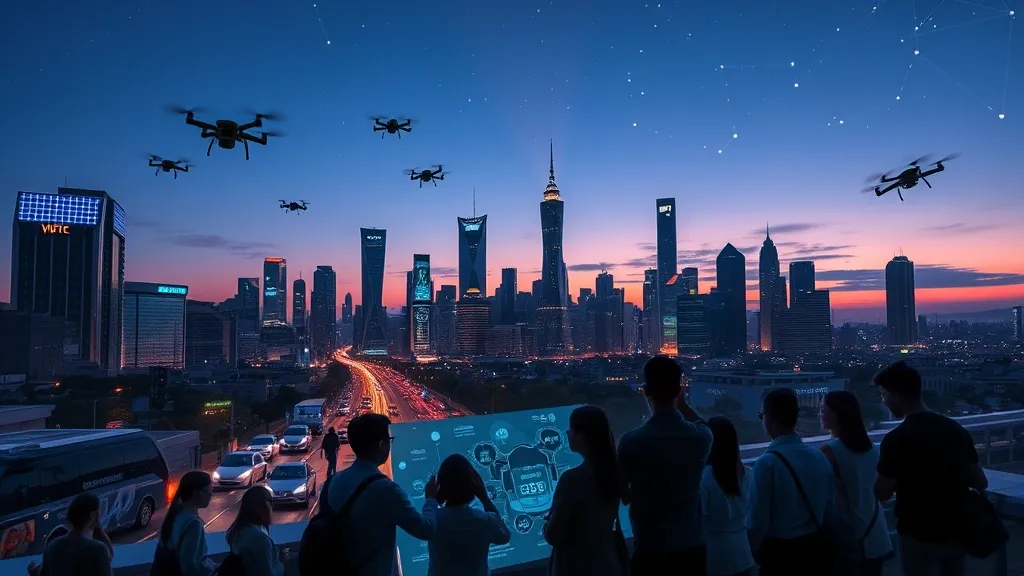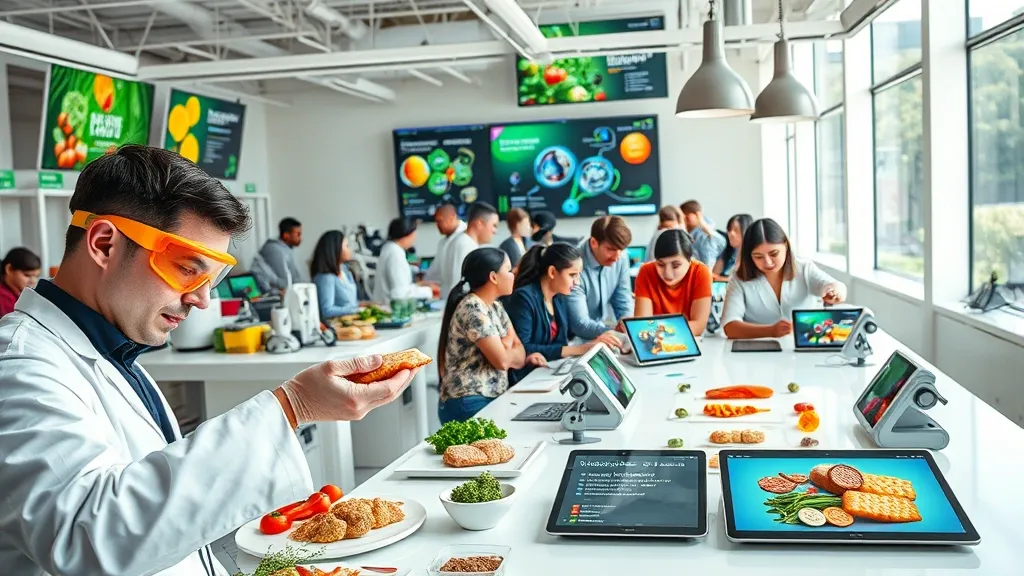Introduction to Emerging Technologies in 2025
As we approach the mid-2020s, the landscape of technology is poised for a transformative evolution. The year 2025 promises to be a pivotal moment where various emerging technologies converge, reshaping industries, economies, and daily lives. This introduction highlights the key innovations that are expected to emerge and their potential implications for society.
In recent years, advancements in artificial intelligence (AI), blockchain, quantum computing, and biotechnology have accelerated at an unprecedented pace. These technologies, once considered in their infancy, are now on the brink of mainstream adoption, offering new capabilities and solutions to complex problems.
One of the most significant trends is the integration of AI across various sectors. From healthcare to finance, AI is enhancing decision-making processes, optimizing operations, and personalizing user experiences. By 2025, we can anticipate a greater reliance on AI-driven analytics, enabling businesses to forecast trends and respond dynamically to market changes.
Blockchain technology, initially popularized by cryptocurrencies, is now being recognized for its potential to revolutionize data security and transparency. In 2025, we expect to see widespread adoption of blockchain for supply chain management, secure voting systems, and digital identity verification, fostering trust in various transactions and interactions.
Quantum computing, often hailed as the next frontier in computing power, holds the promise of solving complex problems that are currently beyond the reach of classical computers. As we move towards 2025, breakthroughs in quantum algorithms and hardware may lead to applications in pharmaceuticals, materials science, and cryptography, fundamentally altering how we approach these fields.
Biotechnology is also set to make significant strides, particularly in personalized medicine and agricultural innovations. By leveraging genetic engineering and CRISPR technology, we can expect advancements in disease treatment and food production that prioritize sustainability and efficiency.
In conclusion, the convergence of these emerging technologies is not merely a trend but a significant shift that will redefine our world by 2025. As we explore these innovations in the upcoming sections, we will uncover the profound implications they hold for our future.
Key Innovations Transforming Industries
As we look towards 2025, several key innovations are poised to reshape various industries, driving efficiency, enhancing customer experiences, and fostering sustainable practices. These transformative technologies are not only redefining operational paradigms but also creating new opportunities for growth and development across sectors.
1. Artificial Intelligence and Machine Learning
Artificial Intelligence (AI) and Machine Learning (ML) continue to be at the forefront of innovation in numerous fields. From healthcare to finance, AI-driven algorithms are improving decision-making processes, predicting consumer behavior, and personalizing services. In healthcare, AI assists in diagnostics and treatment planning, while in finance, it enhances risk assessment and fraud detection.
2. Internet of Things (IoT)
The Internet of Things (IoT) is revolutionizing industries by interconnecting devices and enabling real-time data exchange. Smart sensors in manufacturing, agriculture, and logistics optimize operations, reduce waste, and enhance productivity. For instance, IoT-enabled machinery can predict maintenance needs, minimizing downtime and costs.
3. Blockchain Technology
Blockchain technology is gaining traction beyond cryptocurrency, offering enhanced security and transparency in transactions. Industries such as supply chain management and finance are leveraging blockchain to ensure traceability and accountability, thus building trust among stakeholders. This innovation streamlines processes and mitigates risks associated with fraud.
4. Renewable Energy Solutions
Innovations in renewable energy technologies are crucial for combating climate change and ensuring sustainable development. Advances in solar panels, wind turbines, and energy storage systems are making clean energy more accessible and affordable. As industries adopt these solutions, they not only reduce their carbon footprint but also create new economic opportunities.
5. Augmented Reality (AR) and Virtual Reality (VR)
AR and VR technologies are transforming the way businesses engage with customers and train employees. In retail, AR enhances the shopping experience by allowing customers to visualize products in their own space. In training and development, VR provides immersive learning experiences, improving knowledge retention and skill acquisition.
In conclusion, the innovations mentioned above are not just trends; they are fundamental shifts that are redefining industries. As organizations adapt to these technologies, the potential for improved efficiency, sustainability, and customer satisfaction will continue to grow, setting the stage for a dynamic future.
Impact of Technology on Society and Daily Life
The rapid advancement of technology is profoundly reshaping our society and daily experiences. By 2025, the influence of emerging technologies will be more pronounced, affecting various aspects of our lives, from communication to work and beyond.
One of the most significant impacts is seen in the realm of communication. The rise of social media platforms and instant messaging applications has transformed how we connect with others. In 2025, we can expect an even greater integration of augmented reality (AR) and virtual reality (VR) in our communication tools, allowing for more immersive interactions. This shift will not only enhance personal relationships but also revolutionize how businesses engage with clients and customers.
In the workplace, technology will continue to redefine job roles and responsibilities. Automation and artificial intelligence (AI) are set to take on tasks that were once performed by humans, leading to increased efficiency and productivity. However, this shift also raises concerns about job displacement and the need for reskilling the workforce. By 2025, we will likely see a greater emphasis on continuous learning and adaptation as employees seek to stay relevant in an evolving job market.
Moreover, technology’s impact extends to our health and well-being. Wearable devices and health applications are already changing how individuals monitor and manage their health. By 2025, advancements in telemedicine and personalized healthcare technologies will make healthcare more accessible and efficient. Patients will benefit from remote consultations and real-time health monitoring, leading to better health outcomes and reduced healthcare costs.
Despite the numerous benefits, the integration of technology into our daily lives also poses challenges. Issues related to privacy, cybersecurity, and the digital divide are becoming increasingly important as more aspects of our lives become digitized. Ensuring equitable access to technology and protecting personal data will be crucial as we navigate these challenges.
In conclusion, the impact of technology on society and daily life by 2025 will be multifaceted. While it promises enhanced communication, improved workplace efficiency, and better health management, it also necessitates a proactive approach to address the accompanying challenges. Embracing these changes will be essential for individuals and society as a whole to thrive in the technology-driven future.
Conclusion: The Path Forward in Technological Advancement
As we navigate through the complexities of 2025, it is evident that technological advancement is not merely a phase but a continuous journey that shapes our world in profound ways. The innovations we have explored throughout this article serve as a testament to the relentless pursuit of progress that defines our era. From artificial intelligence to renewable energy solutions, these technologies are not only transforming industries but also redefining the very fabric of our daily lives.
The path forward requires a collective effort from all stakeholders, including governments, businesses, and individuals. To harness the full potential of these innovations, we must prioritize collaboration and investment in research and development. This collaborative approach will ensure that technology serves as a catalyst for positive change, rather than a source of division or inequality.
Moreover, as we embrace these advancements, ethical considerations must remain at the forefront of our discussions. The implications of technologies such as AI and biotechnology raise critical questions about privacy, security, and the potential for misuse. It is imperative that we establish robust frameworks and regulations that promote responsible innovation while safeguarding societal values.
Furthermore, education and reskilling are essential components of our journey forward. As automation and digital transformation reshape the workforce, it is crucial that we equip individuals with the necessary skills to thrive in this new landscape. Lifelong learning initiatives and access to quality education will empower the next generation to navigate the challenges and opportunities that lie ahead.
In conclusion, the future of technology in 2025 is bright, yet it demands our attention and action. By fostering a culture of innovation, prioritizing ethical standards, and investing in education, we can ensure that technological advancement benefits all of humanity. The choices we make today will pave the way for a more inclusive, sustainable, and prosperous tomorrow. Together, let us embrace this exciting journey and drive the transformative power of technology for the greater good.


